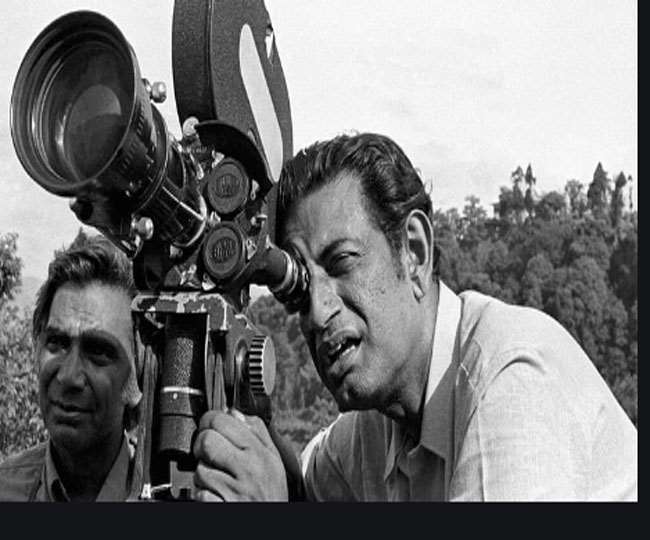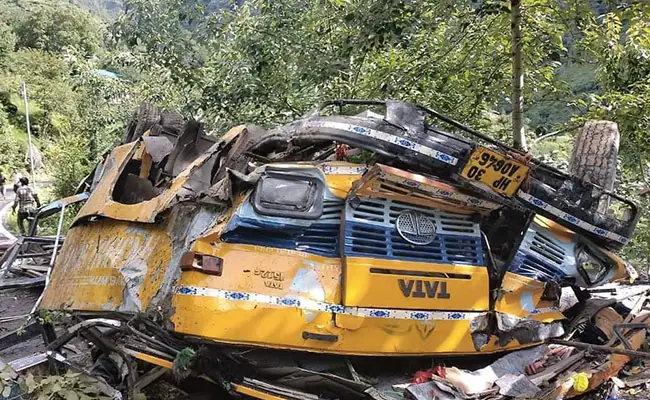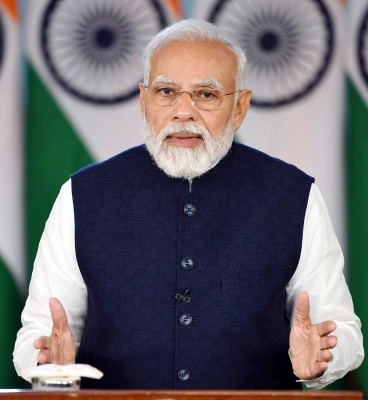India’s Foreign Policy 2021: Some Challenges, But More Successes

New Delhi, Dec 31: The year 2021 saw India taking a lead in providing medical aid to a large part of the Covid-ravaged world even as it continued to explore ways to deal with aggressive big neighbour China and was forced to reshape policy towards Afghanistan following the Taliban takeover.
Strengthening of the Quad partnership and the launch of a new grouping with Israel, the US and UAE, were among the positive highlights in terms of foreign policy in the outgoing year along with the country’s one-month Presidency of the UN Security Council.
As the year closes with Covid-19 rearing its head again in the country, rampaging across much of the Western world and even making its presence felt in secretive China, the emphasis by India on the value of trusted partners and reliable supply chains following the disruptions of last year, has found echo in much of the world.
Without naming China, India has, at multiple fora, highlighted the need for diversification of supply chains from the current over-dependence on one country as the manufacturing and supply hub, and on the need to focus on strategic autonomy in the areas of economy and supply chains.
The year has also seen greater global emphasis on the Indo-Pacific as a region of strategic importance and competition with countries including Australia, and the European Union, underpinning India’s central role in region. India has urged the international community to speak in one voice for strengthening a rules-based world order to protect the oceans from the “race for expansion’’
The Taliban’s sudden takeover of Kabul on August 15 grabbed the spotlight of the world for several weeks, as the US exited the war-ravaged country amid chaos and criticism. The Taliban’s regaining control of Afghanistan after two decades evoked a sense of jubilation in neighbouring Pakistan, that India had finally been sidelined in the influence it exerted in Kabul thanks to its major developmental works there, but that euphoria was not to last long. Islamabad, while being acknowledged openly by much of the world as the power broker in Kabul, has been unable to capitalize on its influence, as it faces deep resentment from the Afghans over what they say is open interference in its affairs and also the lack of control over different factions of the Taliban fighters. Realizing the quicksand that Afghanistan was turning into with the Taliban ingress, India quickly evacuated its personnel from the country and also many Indians and Afghans, including those from the Hindu and Sikh minority.
India’s month-long presidency of the UN Security Council in August coincided with the Taliban takeover, and the resolution 2593 on Afghanistan, adopted on August 30, is still the reigning document quoted by the international community for what it holds the Taliban to – commitment that it will not allow Afghan territory to be used for terror against other countries, upholding the rights of women, children and minorities, and for an inclusive and representative government.
India has been in close touch with other countries on Afghanistan, including with Russia. President Vladimir Putin call up PM Modi to discuss their shared concerns over the threat of terrorism, extremism and drugs spilling across the Afghan border, and both sides set up a mechanism at the level of their security chiefs to remain in close touch over the issue. India also hosted a dialogue at the National Security Advisor level on Afghanistan in November. This was attended by the security chiefs of Russia, Iran, and the five Central Asian countries. Pakistan refused to attend it, and China skipped the meeting, in deference to ‘iron brother’ Islamabad.
India is also sending 50,000 MT of wheat and life saving medicines by road via Pakistan as humanitarian aid to Afghanistan, but the consignment to date is still stuck over modalities with an intransigent Islamabad.
India has made formal contact with the Taliban regime, which in turn has been keen to continue the country’s long association with India. The Taliban leadership also personally interceded with Pakistan Prime Minister Imran Khan to allow the Indian humanitarian assistance in the form of wheat, after which Islamabad relented as a “one time concession”.
With Beijing, relations have seen a decisive chilling, though bilateral trade continues as robust as before. Both External Affairs Minister S Jaishankar and Chinese Foreign Minister Wang Yi met on the sidelines of the SCO gathering of Foreign Ministers in Dushanbe in September to sort out the border issue, but the simmering tension continues along the Line of Actual control in eastern Ladakh with India stating that it expects China to work towards early resolution of the remaining issues.
The coronavirus pandemic brought with it a rethinking of the relevance of multilateral organisations, due to their failure to act in time to help poorer countries with vaccines and medicines, or the abject failure of the WHO to find out the origins of the novel coronavirus, or even heeding India’s plea for patent waiver in the WTO. PM Modi, addressing the UNGA, questioned the credibility of multilateral institutions and called for their reform before they became irrelevant. He called for improving the effectiveness and reliability of the UN and its organs.
Despite China’s efforts to run it down, the Quad has emerged in the forefront as a key grouping between India and other like-minded democracies like the US, Japan and Australia. The first in-person summit meeting in November between the leaders of the four countries saw PM Modi outline the Quad’s future outlook when he said the Quad “will work as a force for global good”. Besides peace and security in the Indo-Pacific, the Quad is now focusing majorly on vaccines, on supply chains and emerging technologies, connectivity and infrastructure, maritime security, climate change and also education.
In their quest to take forward the Quad, both India and Japan have preferred to ignore the formation of AUKUS – a sudden alliance announced between Australia, the UK and US, just days before the Quad leaders’ summit. India has said the AUKUS does not diminish the relevance of the Quad in any way as the former is a security alliance, formed with an objective to manufacture and deliver eight nuclear submarines to Canberra.
However, one outcome of the formation of AUKUS has been a marked deepening of ties between France and India. Angry over the abrupt cancellation of a multi-billion deal by Australia for the manufacture of conventional submarines by France, in favour of the AUKUS deal, Paris has moved closer to India as a trusted long-time partner. This was evident in the phone calls between the French leadership and India, and in the warmth in display in the meeting between French President Emmanuel Macron with PM Modi, and the flurry of high-level visits to India in recent days, including by their Defence Minister Florence Parly who offered to provide more Rafale jets to India if required.
India’s close relations with Israel continue to be marked by warmth, as was evident in the first meeting between PM Modi and his Israeli counterpart Naftali Bennett, who met for the first time on the sidelines of the COP26 in Glasgow, UK, in November. The two sides are preparing to mark 30 years of their strategic diplomatic ties next year.
Post the signing of the historic Abrahamic accords, a new equation has emerged between India, Israel, the US and UAE, which holds promise for the future. The four foreign ministers spoke via video conference in October, during EAM Jaishankar’s visit to Jerusalem, and they are poised to meet in the new year at the Dubai Expo to take the partnership further, in the field of joint projects in transportation, technology, maritime security, and economics and trade.
India is being hailed as the pharmacy of the world, with its booming pharma industry churning out life-saving medicines at affordable prices and leading innovation in the field of healthcare. From giving millions of doses of Covid-19 vaccines as grants and on commercial basis to countries around the world, during the first wave, and resuming the exports recently again, India has earned the gratitude of many far flung countries that have been ignored by the West which hoarded vaccines for its own people.
From being hit by a shortage of PPE kits, masks, sanitisers, and other important gear to tackle Covid when it first hit India, the country has turned into a manufacturing hub of these items, providing them at affordable prices.
As PM Modi said recently, India exported life-saving medicines and medical equipment to over 150 countries and exported Covid vaccines to nearly 100 countries.
While relations with Pakistan have remained thorny, and do not show prospects of getting better, India has focused on building ties with its neighbours, including those in Southeast Asia, through boosting connectivity links, trade, and people to people ties.
The year also saw PM Modi hold his first in-person bilateral with US President Joe Biden and the two leaders appeared to immediately strike a warm chord in ties, as the two countries scale up their strategic partnership.
2021 ended with the holding of the India-Russia bilateral summit for which President Putin paid a flying visit to New Delhi to meet PM Modi on December 6. The visit of the Russian President to Delhi signalled an upswing in India’s longtime ties with Moscow, as both sides also held the inaugural 2+2 meeting between their foreign and defence ministers.
India has stood its ground on the purchase of S-400 missile defence systems from Russia, in the face of threatened sanctions from the US, and also sealed more deals with Moscow, including one on the manufacture of 6 lakh AK-203 assault rifles with technology transfer from Russia, and extended the pact on military cooperation for 10 years from 2021 to 2031.
India has maintained that its foreign relations with a particular country stand independent of its relations with other countries, and that it must be understood as such.






